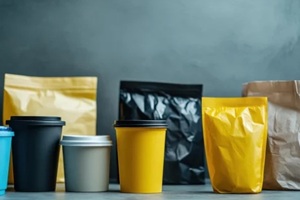January 2, 2025

Recent advancements in compostable plastic technology signal a promising shift toward achieving greater sustainability in the production of plastic materials. These innovative materials are designed to decompose into harmless byproducts such as water and carbon dioxide, offering a promising alternative to conventional plastics.
Their ability to break down in both industrial and home composting environments positions them as an integral player in reducing environmental impact. As the global community becomes increasingly aware of the ecological footprint of traditional plastics, the creation and adoption of compostable plastics represent an important step toward a more eco-friendly future.
To help highlight the importance of this development, this article takes a look at this important advancement in compostable plastic technology and its potential to drive positive environmental change.
Biodegradable plastics are emerging as an incredible innovation in addressing concerns surrounding plastic waste. Thankfully, significant advancements have recently been made in creating materials that decompose naturally.
The recent development of spunbond nonwovens using biodegradable plastic marks a notable step toward more eco-friendly solutions that are suitable for use in home composting.
Spunbond nonwovens are fabric-like materials made from continuous filaments of biodegradable plastic. These plastic materials are designed to be strong and durable while maintaining the ability to decompose naturally, making them suitable for a variety of different practical applications.
Engineered specifically for home composting, these materials decompose efficiently at typical household composting temperatures. They transform into non-toxic byproducts such as water and carbon dioxide, facilitated by the action of natural microorganisms, which makes them both practical and environmentally friendly.
The new spunbond nonwoven material boasts greater durability comparable to traditional plastics, making it suitable for a wide range of applications, from packaging to agricultural uses.
When composted at home, the material breaks down into water and carbon dioxide, facilitated by natural microorganisms. This decomposition process leaves no harmful residues, providing an environmentally safe disposal method and contributing to a more sustainable future.

Biodegradable plastics are finding applications across diverse industries. Their versatility and environmental benefits make them ideal for replacing conventional plastics. Spunbond nonwovens, in particular, offer sustainable solutions for various practical uses.
Spunbond nonwovens made from biodegradable plastic are being used in different applications, including packaging for food and the making of certain agricultural materials. These applications capitalize on the material’s strength and compostability.
Join our PLASTICS Pulse newsletter today to receive updates on within the plastic industry while staying informed & connected.
Compostable plastics offer significant environmental advantages over traditional plastics, playing an essential role in reducing plastic waste as a whole while promoting sustainability. Understanding the benefits that they provide can help in better appreciating their impact on the environment.
The longevity of traditional plastics in the environment leads to significant pollution and ecological impact.
But in contrast, compostable plastics decompose into benign byproducts, such as water and gases, within a much shorter time frame. Their rapid decomposition process makes compostable plastics a far more environmentally friendly option to utilize than traditional virgin plastic.
These materials also break down without leaving toxic residues, making them a safer alternative to use compared to virgin plastics. Additionally, some manufacturers have enabled decomposition to be facilitated by natural microorganisms, which emphasizes their potential compatibility with the environment.
Compostable plastic materials significantly help reduce waste in both home and industrial composting systems. Through their natural decomposition process, they help minimize the amount of plastic waste that ultimately ends up in landfills and oceans, thereby lessening their overall environmental burden.
The adoption of compostable plastics supports sustainable waste management practices by actively contributing to a circular economy. Their ability to break down into non-toxic substances promotes a healthier environment which actively enhances the overall health of our ecosystems.

Staying informed about advancements in plastic materials is essential for those in the industry who are committed to sustainability. The ongoing development of biodegradable and compostable plastics plays an important role in reducing environmental impact and promoting eco-friendly practices.
Staying informed about these innovations enables individuals and businesses alike to make better-informed decisions that help contribute to a healthier planet. The Plastics Industry Association offers valuable resources and updates on the latest breakthroughs in biodegradable and compostable plastics.
With our insights, resources, and other industry advocacy efforts, we support efforts to implement sustainable solutions across various industries. Check out our magazine and array of other resources for more information, and consider becoming a member today to stay updated on industry developments.
Joining the association guarantees access to the latest research, trends, and innovations in the world of sustainable plastics, helping you continue to stay at the forefront of environmental responsibility.
PLASTICS and the Future Leaders in Plastics (FLiP) Committee are devoted to supporting and encouraging the next generation of plastics leaders who will play a crucial role in the innovation, technology and future of the plastics industry. FLiP’s mission is to provide young professionals under the age of 40 the exposure, education and resources they need to build lifelong careers in plastics. Want to join? Want to get your employees involved? Email: flip@plasticsindustry.org